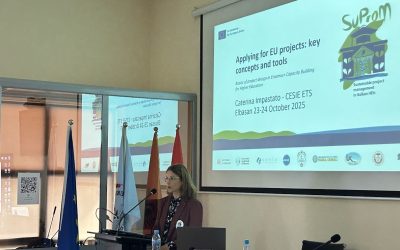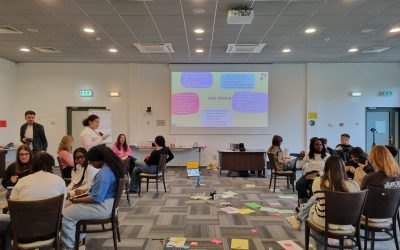The visibility of scientific research and the capacity to engage stakeholders and the public are fundamental to ensure that research results have a real impact both within the academic community and in society. Communicating effectively, building relationships with the socio-economic actors, and enhancing the visibility of the research work carried out by researchers and doctoral candidates allow universities to attract funding, promote collaborations, and contribute to the sustainable development of their country.
TheDIRASA project organised a week-long training in Djerba, Tunisia from September 28th to October 2nd, 2025, focused on how to improve the visibility of Tunisian research and its connection with the socio-economic world. This strategic event brought together participants from the 13 Tunisian universities partnering in the project, as well as representatives from the MESRS and the ANPR, including faculty members, lab directors, post-docs, doctoral candidates, and administrative and technical staff.
The training week was strategic in responding to the Tunisian universities’ need to attract funding and promote effective collaborations. To achieve this, the sessions included fundamental themes such as:
- Interaction with stakeholders in scientific research projects. (CESIE ETS)
- Institutional commitments such as gender equality plan, ethics, and intellectual property.
- Open Access, data management, and use of Creative Commons licenses. (CESIE ETS)
- Strengthening “peer review” to validate scientific discoveries and the importance of providing visibility to the research work and theses of doctoral candidates.
- Mapping international scientific databases and advanced research techniques.
- Valorization of research results and building a publication strategy.
- Focus on the University of Pisa’s practices for scientific research valorisation, intermediation, and technology transfer.
Through theoretical lessons and practical workshops, participants were able to discuss common challenges and good practices to implement in their institutions. The variety of profiles enriched the discussions with concrete experiences and complementary viewpoints spanning academia, research, and administrative management.





The training provided participants with essential practical skills to fulfil two crucial functions for the project. Firstly, it is fundamental for the success and sustainability of the Groupements d’intérêt scientifique (GIS), the research consortia aimed at raising the quality and promoting scientific excellence, by providing them with the tools to best valorise their research work and discoveries. Secondly, it acts as a capacity catalyst for the National Coordination Network, which will be established to effectively engage stakeholders and the socio-economic world in scientific research, transforming cooperation among actors into concrete development.
For more information visit https://dirasa.eu/en/ and follow us on Facebook, X and LinkedIn.
About the project
DIRASA – Définition d’un renouvellement de la gouvernance de la recherche en Tunisie is a project funded within the Erasmus+, Capacity Building in the field of higher education. Capacity-building projects in the field of higher education are transnational cooperation projects based on multilateral partnerships, between Higher Education Institutions and organisations from EU Member states or countries associated to the Programme and third countries not associated to the Programme.
Partners
- Sfax University (Tunisia, coordinator)
- Université de Tunis (Tunisia)
- Université de Tunis El Manar (Tunisia)
- Carthage University (Tunisia)
- University of Sousse (Tunisia)
- Université de Gabes (Tunisia)
- Université de la Manouba (Tunisia)
- University of Monastir (Tunisia)
- Université Virtuelle de Tunis (Tunisia)
- University of Kairouan (Tunisia)
- Université de Gafsa (Tunisia)
- Université of Jendouba (Tunisia)
- Université Ez-Zitouna (Tunisia)
- Ministry of Higher Education And Scientific Research (Tunisia)
- Agence Nationale de la Promotion de la Recherche Scientifique (Tunisia)
- UNIMED – Unione delle Università del Mediterraneo (Italia)
- Università di Pisa (Italy)
- Università degli Studi di Pavia (Italy)
- CESIE (Italy)
- Université de Rouen Normandie (France)
For further information
Read more about DIRASA,visit https://dirasa.eu/ and follow us on Facebook, X and LinkedIn.
Contact Alessia Valenti: alessia.valenti@cesie.org









